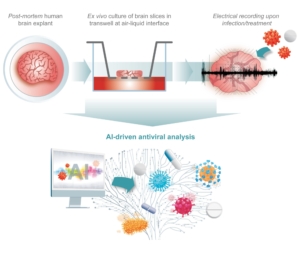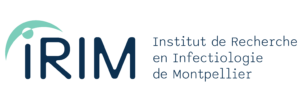
Raphael Gaudin’s team, and in particular the young researchers Emma Partiot and Barbara Gorda, in collaboration with Montpellier researchers (LIRMM, IGMM, CHU Montpellier and IES), published an article in EMBO Molecular Medicine which reports the development of a new ex vivo culture model of human brain explants obtained post-mortem to evaluate the antiviral activity of small chemical molecules using artificial intelligence. The team showed that these explants from human brain cortex could be cultured for several weeks and exhibit spontaneous electrical activity. In addition, these explants can be infected by Tahyna virus, an orthobunyavirus transmitted by mosquitoes and very prevalent in Europe. This model was used to evaluate the effectiveness of a new antiviral molecule, recently patented by the laboratory, thanks to the development of a dedicated artificial intelligence algorithm. Their promising results indicate that the molecule is active on explants from certain donors, partially restoring “normal” neuronal electrical activity, even though one explant did not respond to treatment. Together, this study provides a new physiologically relevant model which could allow in the future to rapidly test the effectiveness and restoration of brain functions of new antiviral molecules targeting neurotropic viruses.
Organotypic culture of human brain explants as a preclinical model for AI-driven antiviral studies. Partiot E, Gorda B, Lutz W, Lebrun S, Khalfi P, Mora S, Charlot B, Majzoub K, Desagher S, Ganesh G, Colomb C, Gaudin R. EMBO Molecular Medicine. 2024 Mar. 10.1038/s44321-024-00039-9. Journal’s cover on April 15, 2024.
